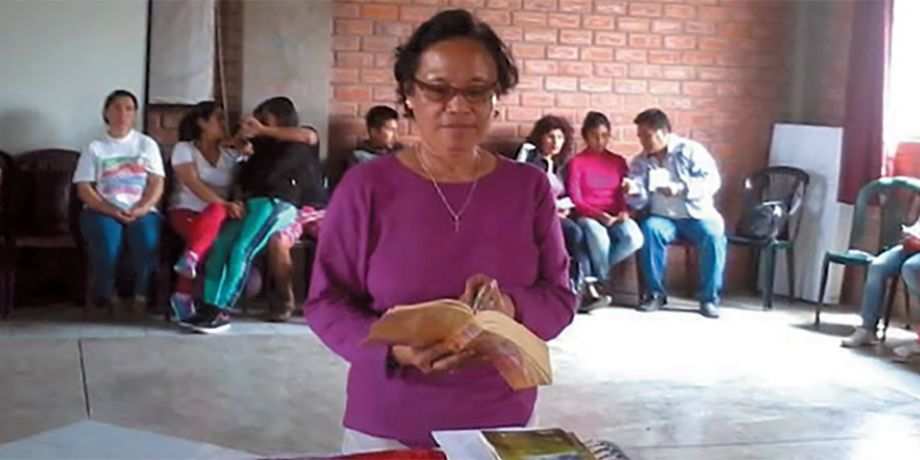
Irma Cantago
I am Irma Lara Cantago, a Columban lay missionary for many years. A high school teacher by profession, I was teaching for fifteen years and at the same time was involved in the parish, helping the catechist and with lay leadership formation. I had the passion to serve and be with the people. The experience that deepened my faith and made me reflect to leave the school someday and be a parish worker. But everything has its own time because I tried many times to leave my job as a teacher but I couldn’t. It was very hard because I enjoyed it. God knows when one is ready to answer His call.
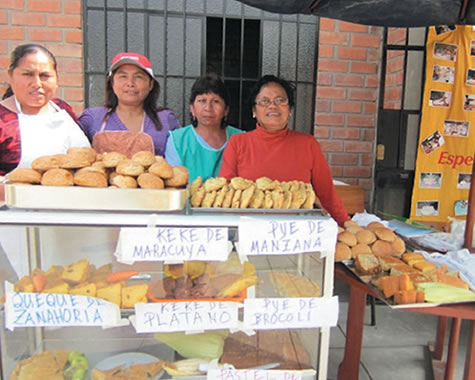
One day I met Columban Fr. Neil Collins asking me if I would like to be a lay missionary overseas. My response was an immediate yes to the question with joy and a light heart to leave the school. The time to fulfill my desire and dream to serve and be an instrument of God in spreading his love and peace to all the creatures on earth. I was accepted in the lay mission orientation in 1992 with five other lay people. Before saying goodbye to everybody I did an act of “letting go” by burning all my school notes with a light and a happy heart. I believe that my fifteen years’ experience as a teacher and as a voluntary parish worker prepared me to answer the call of God to be a Columban lay missionary overseas.
I was happy, but I was facing another difficult situation to leave my mother alone with my six brothers and sisters. Since the death of my father and being the eldest girl in the family I became the right hand of my mother. The first time that I explained everything to my mother about my passion to be a lay missionary she didn’t say anything. I knew it was hard for her to let me go. But later on she told me to go and not to worry about her and my brothers and sisters. I thank my mother, my brothers and sisters for the support. It was not easy for me either to leave them, but I strongly believe that God won’t leave them alone. If it is His will then everything will be fine and He will allow me to reach the place where He wants me to be.
I was appointed to Brazil in 1993, together with Ariel Presbitero, Josie Manuel and John Din. It was the first time to be in another country with a different culture, people, and language. There was a lot of adjustments to the challenging reality that I had to face for three years in a faraway country, uprooted from my comfort zone. It was not easy facing uncertainties of what might happen in the journey, even the fear of traveling by plane for long hours. But the excitement and the feeling of a dream coming true helped me to continue and be firm. My faith was that if it is really God’s call then He will take care of me and bring me to Brazil safely. When God calls, He always provides the grace to venture to the unknown. This grace and energy helped me to continue to the second country where I did my mission was Lima, Peru.
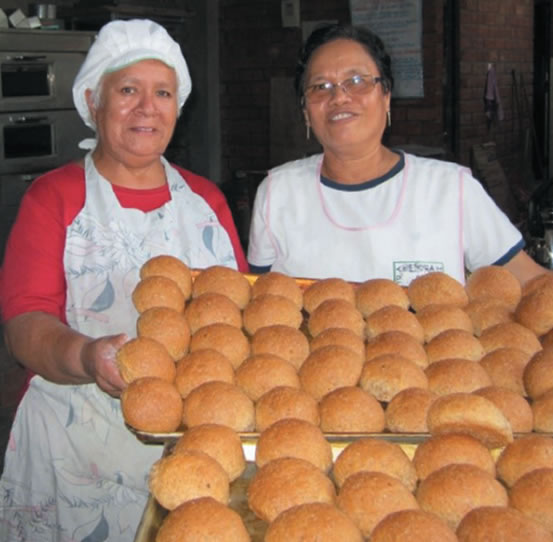 Once again, I was like a child learning to walk, to talk and needing somebody to support me and teach me. I had to surrender and accept that I don’t know a lot of things and I had to learn it from the people. Sometimes you have to learn to do things that you are not familiar with and you don’t like to do. One youth in Brazil asked us if we came to solve their problems. Our answer was just a no because we didn’t have enough language that time. Columban Fr. Colin McLean explained to them our presence in their community. The comment made me reflect. I tried very hard to learn Portuguese because otherwise I might just let the other person speak for me because they assume that I don’t know the language.
Once again, I was like a child learning to walk, to talk and needing somebody to support me and teach me. I had to surrender and accept that I don’t know a lot of things and I had to learn it from the people. Sometimes you have to learn to do things that you are not familiar with and you don’t like to do. One youth in Brazil asked us if we came to solve their problems. Our answer was just a no because we didn’t have enough language that time. Columban Fr. Colin McLean explained to them our presence in their community. The comment made me reflect. I tried very hard to learn Portuguese because otherwise I might just let the other person speak for me because they assume that I don’t know the language.
Living in a foreign country was frustrating and at the same time frightening because of the violence in families and on the street. It seems that everybody has a gun and almost every night you can hear gunshots. One day a neighbor warned us to be careful because somebody in the community was planning to rob our house during the week. I was alert during the week, waiting for the man. But thanks to God, the man was caught by the police for drugs.
While I was in Brazil, I need to learn their dance — the samba — so I can join them or else they will feel bad if I am just sitting down watching. I tried to show them that I was also enjoying their parties, the conversation and their jokes. I learned a lot from the Brazilians and the Columbans in Brazil. I experienced the concern and love of God through the Columbans, other lay missionaries and the economically poor people in the “invasion area” where I worked. It challenged more my passion to continue as a lay missionary even after the closure of the Brazil mission.
In Peru, the advantage was the mission experience I had already from Brazil. Peru is still in Latin America so there are some similarities in the culture and language though there are differences in lifestyle and ways of celebrating life. I did learn how to listen and be flexible in order to understand and be a part of their culture. The people of Peru taught me a lot to learn their own language and jokes. They taught me to celebrate life in the midst of their poverty, dancing and enjoying the night, even with a hungry stomach.
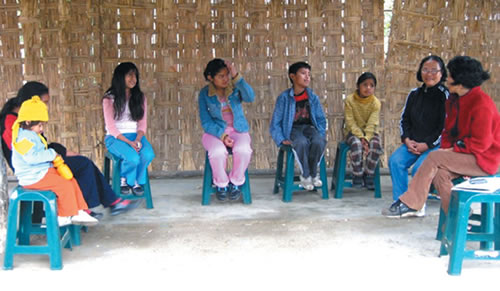 For the Peurvians drinking and dancing are important, and the food will follow very late in the evening or early morning when you are ready to go home. As a Filipina, we have food first before the dance so my technique was to eat first before going to the party. People are poor, but they always save money to celebrate special occasions.
For the Peurvians drinking and dancing are important, and the food will follow very late in the evening or early morning when you are ready to go home. As a Filipina, we have food first before the dance so my technique was to eat first before going to the party. People are poor, but they always save money to celebrate special occasions.
In Peru, I was often with my neighbor calling the water truck to buy water. In every prayer meeting and liturgical celebration, the blessing of water is very important. They won’t mind if it is the priest or a lay person who will bless it. They use it to drive out bad spirits or sickness. Many times I was asked to bless the water; at first I was doubtful whether it will function or not. But I saw the deep and sincere faith of the people. In all Eucharistic celebrations, people bring water for the priest to bless.
The different ministries I had both in Brazil and Peru helped me to be more creative, open to learn in order to persevere in the difficulties that I encountered. The acceptance of my presence by the different groups gave me the strength and the confidence to go tell the Christ story to the people. My six years in Brazil and fifteen years in Peru were in the poor communities. I accompanied the catechists and did a literacy program for out-of-school children and youth in Brazil. In Peru I accompanied adults, adolescents and children. I was involved with catechism, human promotion, parish environmental promotion, the parish baptism team and the pastry-and-baking project for single and abandoned mothers. I enjoyed working with them, listening to their stories and being a part of the struggle of the poor and marginalized. Many times, I asked myself how to help the people and be a “wounded healer” especially to the victims of family violence. In Peru, gang fighting in the streets is a problem: they used stones and killed each other with them. I was trapped many times in their fights so I had to run from the flying stones.
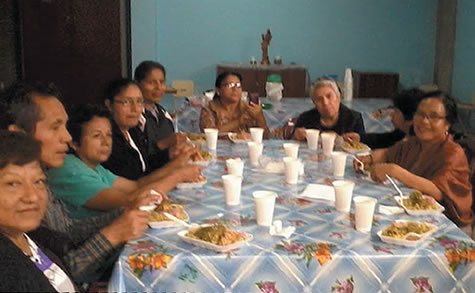
Machismo is very strong in both countries. Women have to serve the men and are not that free to go out. Women and children suffer a lot of violence. Not all were asking for material things but my presence, being with them in their hard moments was already a big help. What matters most was the friendship, letting them feel that you are one of them, that you are there when they need you.
I was generally comfortable with the groups though there were times of disagreements and fights that brought lessons for me and the people. There were frustrations, confusion, and new realities that were not easy to deal with, including with the Columbans. I tried not to waste my energy and let the good experiences in mission dominate the negative feelings. The hard experiences were in fact a blessing, making my faith stronger that God won’t leave me alone.
The mission helped me grow as a person, a missionary, and a caretaker both of myself and all creatures around me. I became closer to God, the Columbans and the Peruvians who walked with me. God was with me in all these years revealing himself in many ways in difficult times, and He will always will be. One of the greatest gifts that God is giving me, is the passion and the grace to go on. God will always be with me and the people I left behind. I believe God’s image is revealed in many different ways in different realities and cultures.
For the many years I shared my life in Peru, I know that I have learned and grown a lot. It was an affirmation that every lay person is a missionary to their own family, neighbors, their own parish and the society. Some people need others to encourage them, to trust them, and allow them to make mistakes and the chance to improve themselves. I could say that the Catholic church is alive until now because of the lay active participation. Even if there are a lot of priests, nuns and religious sisters in a parish, if there is no lay participation then the church will die. Based on my experience, empowering lay people, giving them the space to be a part and be responsible will help it to continue to be alive. I could say that even if laity do not frequent Sunday Masses, they contribute to the life of the church in many other ways. Active lay people never stop inviting and inspiring everybody to participate.
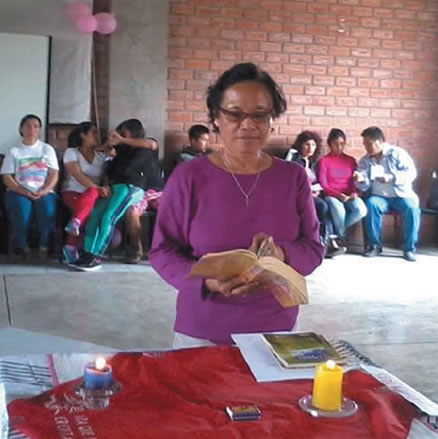
Recognizing the presence and the face of God with the people of different cultures and ways of celebrating life is a gift. I am evangelized by all who journey with me. The treasure that is a part of me and I will bring it wherever God wants me to tell Christ’s story. The uniqueness and beauty of the different cultures and people that I encountered teach me to appreciate and value my own culture.
The presence of Columban lay missionaries challenges other lay people to reflect on their role, vocation, and their mission. It empowers lay people to be missionaries in their own homes, community and society. Lay people can identify themselves with Columban lay missionaries and feel free to share their struggles. Another contribution is the witness of a simple lifestyle, love and respect. As a lay missionary I lived in the community with the poor letting them feel that I was one of them, that we are children of God and a part of the church. Our being partners with the ordained in mission is a revelation to the people that everyone is missionary. To be a lay missionary is a call to value and defend the life of all creatures. Another challenge for lay missionaries is to look for funds because one needs capital to use in order to teach the poor people to not be dependent, and to defend themselves in a healthy environment with dignity. It is also a challenge for lay missionaries to support one another so when one leaves, he/she does so with a light heart, happy and proud to tell her/his story of life in mission.
God has given us the gift of life and of the earth in order to enjoy the beauty of His creation but with the responsibility to take care of it, this too is mission. A million thanks to my family, friends , the Columbans and the people of Brazil and Peru for this enriching experience and the sacred space of being partners in mission . I am what I am now because of all of you. There is always something to learn every day that prepares us for the next day.
Former Columban lay missionary Irma Cantago provided this reflection on her mission experience.